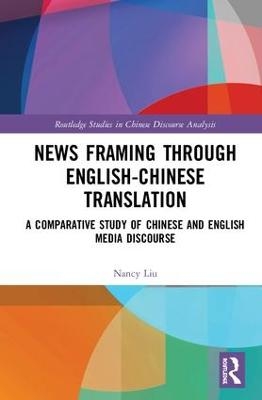
News Framing through English-Chinese Translation
Routledge (Verlag)
978-1-138-30403-1 (ISBN)
News Framing Through English-Chinese Translation provides a useful tool to depict how Chinese news translation can be examined in the era of globalization.
The author has integrated framing theory in journalism studies with translation studies and developed a new theoretical model/framework named Transframing. This interdisciplinary model is pioneering and will make theoretical and conceptual contributions to translation studies. This book aims to reveal ideological, sociocultural and linguistic factors creating media discourse by examining Chinese media discourse, in comparison to its counterpart in English.
Through the analysis of both quantitative and qualitative methods, it is concluded that the transframing model can be applied to interpreting, describing, explaining as well as predicting the practice of news translation.
Nancy Xiuzhi Liu received her MA in Translation and Interpreting from the University of Newcastle-upon-Tyne and her PhD in International Communications from the University of Nottingham. Since 2008, she has been working at the University of Nottingham Ningbo China as Assistant Professor in translation and interpreting between mandarin and English. She writes and presents widely on issues of media text translation, sociocultural meanings of translation, translation of texts with cultural-specific items and pedagogy in translation and interpretation. She is also a practitioner of both translation and interpreting between Chinese and English.
List of Tables
List of Figures
Chapter 1 Introduction
1.1 Two Unique Newspapers
1.2 Framing Studies and News Translation
1.3 Goals of the Book
1.4 Scope of the Book
1.5 Methodology and Data Collection
1.6 Structure of the Book
Bibliography
Chapter 2 Transframing: A Bridge Concept in News Translation
2.1 Introduction
2.2 News Framing and News Translation
2.3 Transframing: A Bridge Concept in News Translation
2.4 Macro Framework of Analysis of News Transframing
2.5 Summary
Bibliography
Chapter 3 Operationalization of the Transframing Model
3.1 Influencers of Transframing
3.2 Indicators of Transframing
3.3 Research Model of Transframing
3.4 Identification of Frames
3.4.1 Principles to identify frames
3.4.2 Focal points to locate frames
3.5 Design of Coding Schemes
3.6 Critical Discourse Analyses
3.7 Summary
Bibliography
Chapter 4 Application of the Transframing Model
4.1 Introduction
4.2 Correlations between the influencers and indicators of transframing
4.2 Method of analysis
4.2.1 Content analysis
4.2.2 Discourse analyses
4.3 Summary
Bibliography
Chapter 5 Story Tone Being Key Determiner of Transframing
5.1 Introduction
5.2 Story Tone Determines Framing Tone
5.2.1 Neutral framing tone
5.2.2 Positive framing tone
5.2.3 Negative framing tone
5.2.4 Summary
5.3 Story Tone Correlated with Framing Meaning
5.3.1 Framing meaning remaining the same
5.3.2 Framing meaning added
5.3.3 Framing meaning reduced
5.3.4 Summary
5.4 Story Tone Associated with Framing Degree
5.4.1 Framing degree remaining the same
5.4.2 Framing degree strengthened
5.4.3 Framing degree weakened
5.4.4 Summary
5.5 Story Tone Related to Framing Device
5.5.1 Framing device remaining the same
5.5.2 Framing device partly changed
5.5.3 Framing device totally changed
5.5.4 Summary
5.6 Story Tone Affects Transframing Strategies
5.7 Conclusion
Chapter 6 Story Type Correlated Strongly with Transframing
6.1 Introduction
6.2 Story Type Determines Framing Tone
6.2.1 Neutral framing tone
6.2.2 Positive framing tone
6.2.3 Negative framing tone
6.2.4 Summary
6.3 Story Type Correlated with Framing Meaning
6.3.1 Framing meaning remaining the same
6.3.2 Framing meaning added
6.3.3 Framing meaning reduced
6.3.4 Summary
6.4 Story Type Associated with Framing Degree
6.4.1 Framing degree remaining the same
6.4.2 Framing degree strengthened
6.4.3 Framing degree weakened
6.4.4 Summary
6.5 Story Type Related to Framing Device
6.5.1 Framing device remaining the same
6.5.2 Framing device partly changed
6.5.3 Framing device totally changed
6.5.4 Summary
6.6 Story Type Affects Transframing Strategies
6.7 Conclusion
Chapter 7 Story Sensitivity Closely Associated with Transframing
7.1 Introduction
7.2 Story Sensitivity Determines Framing Tone
7.2.1 Neutral framing tone
7.2.2 Positive framing tone
7.2.3 Negative framing tone
7.2.4 Summary
7.3 Story Sensitivity Correlated with Framing Meaning
Table 10 Story Sensitivity* Framing Meaning Crosstabulation
7.3.1 Framing meaning remaining the same
7.3.2 Framing meaning added
7.3.3 Framing meaning reduced
7.3.4 Summary
7.4 Story Sensitivity Associated with Framing Degree
7.4.1 Framing degree remaining the same
7.4.2 Framing degree strengthened
7.4.3 Framing degree weakened
7.4.4 Summary
7.5 Story Sensitivity Related to Framing Device
7.5.1 Framing device remaining the same
7.5.2 Framing device partly changed
7.5.3 Framing device totally changed
7.5.4 Summary
7.6 Story Sensitivity Affects Strategies of Transframing
7.7 Word Count
7.8 Filtered Tests
7.9 Conclusion
7.10 Conclusion to the Overall Analysis
Chapter 8 Contexts of Transframing
8.1 Introduction 197
8.2 The Political Context
8.3 The Ideological Context
8.4 The Economic Context
8.5 The Journalistic Context
8.6 Transframing Strategies
8.7 Summary
Bibliography
Chapter 9 Conclusions
9.1 Theoretical Model of Transframing
9.2 More Thoughts on the Investigation
9.3 Significance and Application of the Theoretical Model
9.4 Further Thoughts for Future Work
Bibliography
Appendix
Notes
| Erscheinungsdatum | 21.11.2018 |
|---|---|
| Reihe/Serie | Routledge Studies in Chinese Discourse Analysis |
| Zusatzinfo | 12 Tables, black and white |
| Verlagsort | London |
| Sprache | englisch |
| Maße | 156 x 234 mm |
| Gewicht | 358 g |
| Themenwelt | Schulbuch / Wörterbuch ► Wörterbuch / Fremdsprachen |
| Geisteswissenschaften ► Sprach- / Literaturwissenschaft ► Sprachwissenschaft | |
| Sozialwissenschaften ► Kommunikation / Medien ► Journalistik | |
| ISBN-10 | 1-138-30403-4 / 1138304034 |
| ISBN-13 | 978-1-138-30403-1 / 9781138304031 |
| Zustand | Neuware |
| Informationen gemäß Produktsicherheitsverordnung (GPSR) | |
| Haben Sie eine Frage zum Produkt? |
aus dem Bereich


